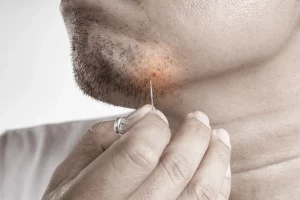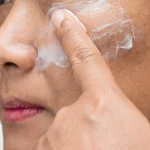Folliculitis is a condition that occurs when hair follicles become inflamed. Causes include bacteria, fungi, or even ingrown hair. In severe cases, it can lead to scarring and permanent hair loss. Treatment depends on the underlying cause but may involve antibiotics, antifungals, or other medications. With proper treatment, it usually clears up within a few weeks. However, it can recur and may require long-term management in some cases.
Folliculitis Causes
Causes include several things such as bacteria, fungi, and even ingrown hair.
Bacteria: Inflamed hair follicles commonly occur due to bacteria that invade the hair follicle. Staphylococcus aureus is the most common type of bacteria that causes inflamed hair follicles. This bacterium is typically found on the skin and in the nose of healthy people. It only becomes a problem when it gets into the hair follicle and begins to grow. Other bacteria that can cause inflammation of hair follicles include Pseudomonas aeruginosa and Escherichia coli.
Fungi: Another common cause of this condition is fungi. The most common type of fungus that causes inflamed hair follicles is Candida albicans, usually found in the digestive tract, mouth, and vagina. It only becomes a problem when it gets into the hair follicle and begins to grow. Other fungi that can cause inflamed hair follicles include Trichophyton rubrum and Malassezia globosa.
Ingrown Hair: An ingrown hair can also cause inflamed hair follicles. This condition occurs when the hair grows back into the skin, not out of the follicle. Ingrown hairs typically happen when hair is shaved or plucked too close to the skin when hair is very curly and grows back into the skin instead of out of the follicle, or tight clothing rubbing against the skin and hair.
Folliculitis Symptoms and Risk Factors
Inflamed hair follicle symptoms include redness, itching, and pain. The redness is caused by inflammation of the hair follicle. The itching happens because of the bacteria or fungi growing in the hair follicle. The pain occurs due to inflammation. In severe cases, it can lead to scarring and permanent hair loss.
There are several risk factors for inflamed hair follicles. These include:
- Having a weakened immune system: People with HIV/AIDS, cancer or other conditions that weaken the immune system are at increased risk for inflamed hair follicles.
- Being on certain medications: People taking steroids, antibiotics, or other medicines that suppress the immune system are at increased risk for inflamed hair follicles.
- Having a skin condition: People with psoriasis, eczema, or other skin conditions are at increased risk for inflamed hair follicles.
Other risk factors include having diabetes and being overweight. People who have had folliculitis in the past are also at a higher risk of developing it again.
Folliculitis Treatment
Inflamed hair follicles treatment depends on the underlying cause.
Bacteria: If bacteria cause it, treatment usually requires antibiotics. The most common type of antibiotic used to treat inflamed hair follicles is mupirocin. This antibiotic is available in a cream or ointment applied to the affected area three times a day for seven days. Other helpful antibiotics include clindamycin, erythromycin, and levofloxacin.
Fungi: If fungi cause it, treatment includes antifungals. The most common type of antifungal used to treat inflamed hair follicles is clotrimazole. This antifungal is available in a cream or lotion applied to the affected area two times a day for seven days. Other antifungals that may be used include ketoconazole, miconazole, and terbinafine.
Ingrown Hair: If it is caused by ingrown hair, treatment includes several medications. The first medication is a corticosteroid cream or ointment. This ointment will help to reduce inflammation and itching. The second medication is an antibiotic cream or ointment. This cream will help to kill the bacteria that are causing the infection. The third medication is an antifungal cream or lotion. This antifungal will help to kill the fungi that are causing the infection.
Preventing Inflamed Hair Follicles
There are several things that you can do to prevent inflamed hair follicles.
-Wash the affected area with soap and water two times a day.
-Apply a topical antibiotic or antifungal cream or ointment to the affected area as directed by your doctor.
-Avoid shaving or plucking the hair in the affected area.
-Wear loose-fitting clothing that does not rub against the skin.
-Avoid sharing towels, razors, or other personal items with others.
-If you have a cut or scrape, clean it with soap and water and cover it with a bandage.






